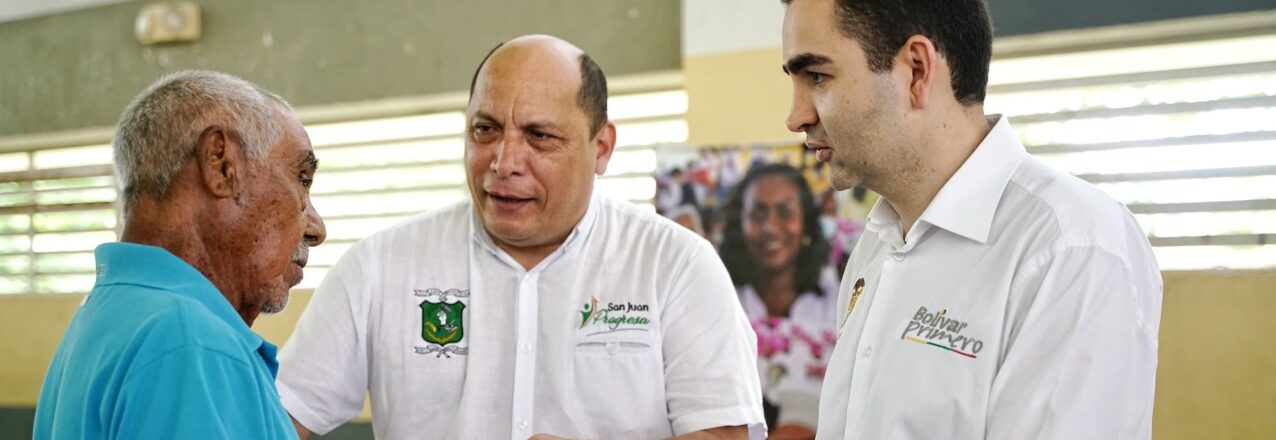Q&A with the Mayor of San Juan Nepomuceno, Wilfrido Romero, and Bolívar’s Habitat Secretariat, Jorge Luís Valle
Regional Land Offices
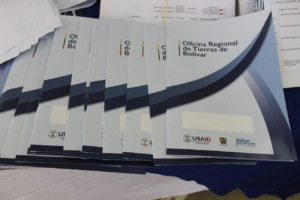 USAID is promoting an innovative land administration strategy that supports the creation of Regional Land Offices (RLOs) in partnership with regional governments across Colombia. RLOs address issues of land formalization in municipalities with limited resources. RLO land formalization teams, which include a land surveyor and legal expert, rotates around the department, working in municipalities where local leaders have limited budgets and experience with titling property. The strategy takes advantage of economies of scale, allowing municipal leaders to share costs, and strengthens land use planning between municipal and regional leaders. RLOs interface with Colombia’s property registry authority, the Superintendence of Notaries and Registers, which is often located far from rural municipalities. They also assist with the titling of properties in urban areas, including public properties with schools and health centers, and provide technical assistance and training.
USAID is promoting an innovative land administration strategy that supports the creation of Regional Land Offices (RLOs) in partnership with regional governments across Colombia. RLOs address issues of land formalization in municipalities with limited resources. RLO land formalization teams, which include a land surveyor and legal expert, rotates around the department, working in municipalities where local leaders have limited budgets and experience with titling property. The strategy takes advantage of economies of scale, allowing municipal leaders to share costs, and strengthens land use planning between municipal and regional leaders. RLOs interface with Colombia’s property registry authority, the Superintendence of Notaries and Registers, which is often located far from rural municipalities. They also assist with the titling of properties in urban areas, including public properties with schools and health centers, and provide technical assistance and training.
In October, USAID’s largest land tenure investment, Land for Prosperity, was on hand for the launch of the Regional Land Office in the Department of Bolívar, located in the Montes de María region of northern Colombia.
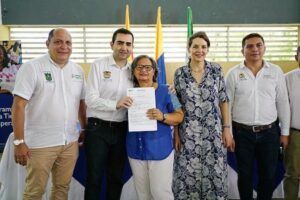 At the event, regional leaders delivered 146 land titles to landowners in the municipalities of Arjona, Calamar, Cartagena, El Carmen de Bolívar, Magangué, Mahates, María la Baja, San Jacinto, San Juan Nepomuceno, Santa Rosa del Sur, and Simití. RLOs ensure gender equality and a total of 108 land titles benefited women. The Bolívar RLO plays a central role in the Departmental Land Working Group, which coordinates tasks related to land administration and property formalization in the department in efforts to increase the efficiency of land titling and promote a culture of formal land ownership.
At the event, regional leaders delivered 146 land titles to landowners in the municipalities of Arjona, Calamar, Cartagena, El Carmen de Bolívar, Magangué, Mahates, María la Baja, San Jacinto, San Juan Nepomuceno, Santa Rosa del Sur, and Simití. RLOs ensure gender equality and a total of 108 land titles benefited women. The Bolívar RLO plays a central role in the Departmental Land Working Group, which coordinates tasks related to land administration and property formalization in the department in efforts to increase the efficiency of land titling and promote a culture of formal land ownership.
In this interview, the Mayor of San Juan Nepomuceno, Wilfrido Romero, and Bolívar’s Habitat Secretariat, Jorge Luís Valle, shared their insights on how the Bolívar RLO can ensure sustainable land administration in the department.
What does the launch of the Regional Land Office mean for Bolívar’s communities?
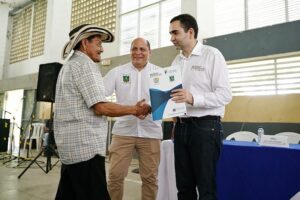 W.R: A well-organized office brings people closer to the habits of legal land ownership so that their land titles can be passed from generation to generation and from owner to owner. It is an invitation to the community to align itself with the office, to resolve their doubts with clear and accurate information, and to learn how to do land transactions moving forward.
W.R: A well-organized office brings people closer to the habits of legal land ownership so that their land titles can be passed from generation to generation and from owner to owner. It is an invitation to the community to align itself with the office, to resolve their doubts with clear and accurate information, and to learn how to do land transactions moving forward.
J.V: In a word, it represents rural development. It means formalized property. It is the opportunity for the residents of Bolívar who still live on untitled land to own a property that they can feel with the security that it belongs to them, because it has the legal support of the state.
How does the launch of the RLO impact the San Juan Nepomuceno community?
W.R: It means that finally, the people who are in this territory can have property titles because this is something that people always dream of, having something of their own and knowing that no one will kick them out of their territory.
What other benefits does the RLO bring to the community when completing land transactions?
W.R: In San Juan Nepomuceno, this is an opportunity to boost agricultural development. Property titles allow families to access credit and other resources, which will facilitate investment in their farms and the development of our municipality.
How can the RLO be sustained into the future?
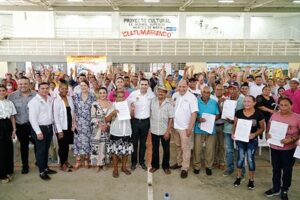 J.V: Without a doubt it can and will be over time. The Bolivar Regional Land Office is a strategic ally to reach each of the municipalities and the villages in corregimientos, and veredas in Bolívar. I believe the office is the critical link to continue formalizing land and properties, and to convert registered property titles into a positive habit of the community.
J.V: Without a doubt it can and will be over time. The Bolivar Regional Land Office is a strategic ally to reach each of the municipalities and the villages in corregimientos, and veredas in Bolívar. I believe the office is the critical link to continue formalizing land and properties, and to convert registered property titles into a positive habit of the community.
Cross-posted from USAID Exposure


